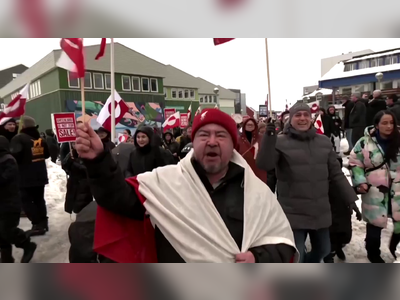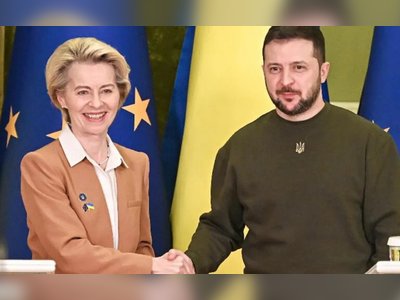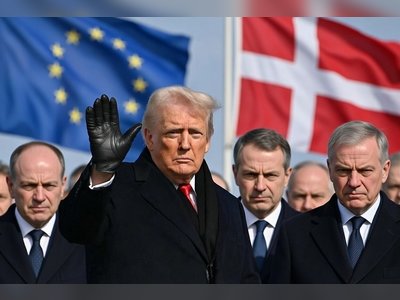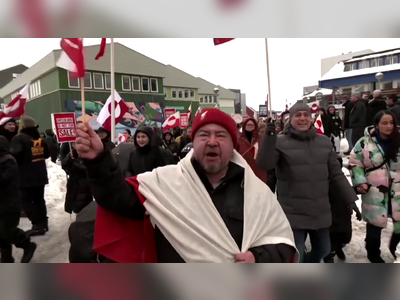Trump and Zelenskyy Engage in Constructive Dialogue Amidst Ceasefire Talks
U.S. President Donald Trump and Ukrainian President Volodymyr Zelenskyy discuss a partial ceasefire and military aid amid ongoing tensions with Russia.
U.S. President Donald Trump and Ukrainian President Volodymyr Zelenskyy held a telephone conversation described as 'very good' on Wednesday, marking their first discussion since a contentious meeting in the White House three weeks prior.
Zelenskyy characterized the call as 'positive, very substantive, and frank' and indicated his acceptance of a partial ceasefire agreement that Trump had negotiated with Russian President Vladimir Putin just one day earlier.
The White House confirmed that Trump committed to assisting Ukraine in acquiring additional air defense systems to bolster its military capabilities.
The previous encounter between Trump and Zelenskyy had degenerated into a tense exchange, raising concerns among allies regarding the future of U.S.-Ukrainian relations.
In the wake of this friction, Zelenskyy has made efforts to mend ties, expressing gratitude multiple times during the recent call and confirming his endorsement of the ceasefire initiative.
Following their conversation, Zelenskyy announced the intent to instruct their respective teams to iron out the technicalities required for implementing and expanding the newly agreed-upon partial ceasefire.
Initial discussions had revolved around a full ceasefire; however, Putin had rejected that option, proposing instead a limited cessation of strikes targeting energy infrastructure and hostilities in the Black Sea.
Trump, in a post via his social media platform Truth Social, noted that the phone call lasted approximately one hour and emphasized that much of the dialogue was aligned with his prior discussion with Putin.
He asserted that both Russia and Ukraine's requirements were being considered in these negotiations.
Ukrainian officials expressed optimism regarding improved relations with the Trump administration.
Mykhailo Podolyak, an aide to Zelenskyy, referred to the previous Oval Office discussion as emotionally charged, suggesting built-up tensions were addressed during the latest discussion.
He indicated that both administrations have reached a synchronized position evident in their commitments, including the recent agreements made in Saudi Arabia regarding military support.
Despite this progress, certain rhetoric from the White House remains concerning to Kyiv's European allies.
On Wednesday, Trump's envoy Steve Witkoff praised the dialogue between Trump and Putin as a collaboration beneficial to global interests.
Podolyak shared a more cautious perspective on the Trump administration's approach of softened communication with Russia, emphasizing skepticism over the feasibility of establishing 'trust' with Moscow.
In addition to discussions around the ceasefire, a pending agreement on U.S. access to Ukraine's mineral resources remains unsigned.
Trump, during the call, proposed a U.S. takeover of Ukrainian power plants, stating that such ownership would provide robust protection and support for Ukraine's energy infrastructure.
The reaction from Zelenskyy regarding this proposal was not immediately disclosed.
Clarification was sought on the specifics of the Trump-Putin conversation, as the U.S. and Russian administrations released differing accounts afterward.
Trump suggested the ceasefire would encompass broader civilian infrastructure, while Zelenskyy referenced a cessation of strikes affecting both energy and civilian infrastructure.
Russian spokesperson Dmitry Peskov later clarified that the ceasefire primarily pertains to the energy sector only.
Furthermore, the Kremlin outlined that any serious peace negotiations would necessitate a complete end to foreign military assistance and intelligence support to Ukraine.
Trump, speaking on Fox News, refuted any discussions of aid during his conversation with Putin.
Peskov contradicted this, stating that halting arms deliveries to Kyiv was indeed a topic of discussion between the two leaders.
Ukrainian officials dismissed the Kremlin's demands as unrealistic, with Podolyak describing them as an expectation for Ukraine to disband its military capabilities, abandon security alliances, and relinquish territorial claims.
Reports indicate that there has been no indication from Putin of a shift away from his core objectives, with recent coverage confirming that he remains intent on achieving complete control and international recognition of the regions annexed by Russia in 2022.
Zelenskyy characterized the call as 'positive, very substantive, and frank' and indicated his acceptance of a partial ceasefire agreement that Trump had negotiated with Russian President Vladimir Putin just one day earlier.
The White House confirmed that Trump committed to assisting Ukraine in acquiring additional air defense systems to bolster its military capabilities.
The previous encounter between Trump and Zelenskyy had degenerated into a tense exchange, raising concerns among allies regarding the future of U.S.-Ukrainian relations.
In the wake of this friction, Zelenskyy has made efforts to mend ties, expressing gratitude multiple times during the recent call and confirming his endorsement of the ceasefire initiative.
Following their conversation, Zelenskyy announced the intent to instruct their respective teams to iron out the technicalities required for implementing and expanding the newly agreed-upon partial ceasefire.
Initial discussions had revolved around a full ceasefire; however, Putin had rejected that option, proposing instead a limited cessation of strikes targeting energy infrastructure and hostilities in the Black Sea.
Trump, in a post via his social media platform Truth Social, noted that the phone call lasted approximately one hour and emphasized that much of the dialogue was aligned with his prior discussion with Putin.
He asserted that both Russia and Ukraine's requirements were being considered in these negotiations.
Ukrainian officials expressed optimism regarding improved relations with the Trump administration.
Mykhailo Podolyak, an aide to Zelenskyy, referred to the previous Oval Office discussion as emotionally charged, suggesting built-up tensions were addressed during the latest discussion.
He indicated that both administrations have reached a synchronized position evident in their commitments, including the recent agreements made in Saudi Arabia regarding military support.
Despite this progress, certain rhetoric from the White House remains concerning to Kyiv's European allies.
On Wednesday, Trump's envoy Steve Witkoff praised the dialogue between Trump and Putin as a collaboration beneficial to global interests.
Podolyak shared a more cautious perspective on the Trump administration's approach of softened communication with Russia, emphasizing skepticism over the feasibility of establishing 'trust' with Moscow.
In addition to discussions around the ceasefire, a pending agreement on U.S. access to Ukraine's mineral resources remains unsigned.
Trump, during the call, proposed a U.S. takeover of Ukrainian power plants, stating that such ownership would provide robust protection and support for Ukraine's energy infrastructure.
The reaction from Zelenskyy regarding this proposal was not immediately disclosed.
Clarification was sought on the specifics of the Trump-Putin conversation, as the U.S. and Russian administrations released differing accounts afterward.
Trump suggested the ceasefire would encompass broader civilian infrastructure, while Zelenskyy referenced a cessation of strikes affecting both energy and civilian infrastructure.
Russian spokesperson Dmitry Peskov later clarified that the ceasefire primarily pertains to the energy sector only.
Furthermore, the Kremlin outlined that any serious peace negotiations would necessitate a complete end to foreign military assistance and intelligence support to Ukraine.
Trump, speaking on Fox News, refuted any discussions of aid during his conversation with Putin.
Peskov contradicted this, stating that halting arms deliveries to Kyiv was indeed a topic of discussion between the two leaders.
Ukrainian officials dismissed the Kremlin's demands as unrealistic, with Podolyak describing them as an expectation for Ukraine to disband its military capabilities, abandon security alliances, and relinquish territorial claims.
Reports indicate that there has been no indication from Putin of a shift away from his core objectives, with recent coverage confirming that he remains intent on achieving complete control and international recognition of the regions annexed by Russia in 2022.
AI Disclaimer: An advanced artificial intelligence (AI) system generated the content of this page on its own. This innovative technology conducts extensive research from a variety of reliable sources, performs rigorous fact-checking and verification, cleans up and balances biased or manipulated content, and presents a minimal factual summary that is just enough yet essential for you to function as an informed and educated citizen. Please keep in mind, however, that this system is an evolving technology, and as a result, the article may contain accidental inaccuracies or errors. We urge you to help us improve our site by reporting any inaccuracies you find using the "Contact Us" link at the bottom of this page. Your helpful feedback helps us improve our system and deliver more precise content. When you find an article of interest here, please look for the full and extensive coverage of this topic in traditional news sources, as they are written by professional journalists that we try to support, not replace. We appreciate your understanding and assistance.











